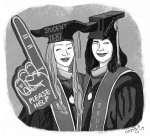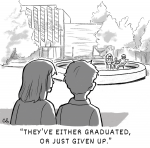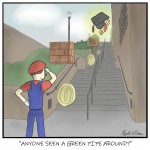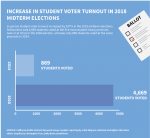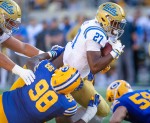Editorial Cartoon: Just Chillin’
Editorial Cartoon: Death Stairs to Graduation
Lawsuits, alcohol bans and violations: Title IX and sexual assault issues recap
UCLA has remained silent regarding several Title IX or sexual assault-related incidents this year due to legal policies or privacy concerns.
Here is an overview of the incidents that occurred and what is known regarding UCLA’s response.
Lawsuit against UCLA fraternities
Then:
A UCLA student filed a sexual assault lawsuit against Sigma Alpha Epsilon, Zeta Beta Tau, the Interfraternity Council and former ZBT member Blake Lobato, in the Los Angeles Superior Court on Aug. 10, 2018.
The lawsuit included charges of negligence, assault, battery and intentional infliction of emotional distress.
According to court documents, Lobato sexually assaulted the student after inviting her to spend the night at ZBT following a party at SAE. The incident was reported to the UCLA Title IX office, prompting a nine-month investigation.
The investigation conducted by the UCLA Title IX office found Lobato had statutorily raped another female student in fall 2015, according to court documents.
Lobato was removed from ZBT in January 2017 and expelled from UCLA in November of the same year after he allegedly made threats against the student’s life.
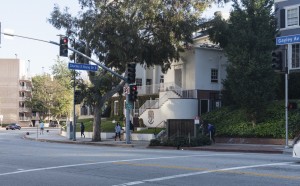
Now:
The litigation is ongoing. Keith Fink, the attorney representing the student filing the suit, said the IFC is the only party to have not appeared in court. He added the IFC claims they did not receive proper notice from the plaintiff to appear in court.
IFC President Josh Kaplan did not respond to requests for comment.
The court will take a default judgement against the IFC because they did not appear in court, Fink said. A default judgment is a ruling against a party failing to appear in court, and is the equivalent of judgement following trial. If a default judgement is issued, Fink said he will win his case against the IFC because they did not appear in court, but he will have to provide evidence for the ruling.
Neither ZBT nor SAE responded to requests for comment. The fraternities previously said they have a policy that does not permit them to comment on pending or threatened litigation.
Fink said he feels UCLA does not adequately encourage members of Greek life to take Title IX trainings seriously. He added he believes UCLA should have informed the student body about the alleged assault sooner and encouraged students to be vigilant at fraternity events.
“In my opinion UCLA could have done a lot of things much better to protect Jane Doe and the other woman who encountered (Lobato), as well as other women on campus,” Fink said.
The UCLA Title IX office, Campus Assault Resources & Education, and the Office of Fraternity and Sorority Life hosted eight sexual violence prevention workshops for students in Greek life during fall quarter.
Lindsey Goldstein, acting director of fraternity and sorority life at UCLA, previously said all students involved in Greek life are required to attend one workshop per year, and chapters are only permitted to host social events if 100% of their members attend the workshop.
UCLA spokesperson Katherine Alvarado said UCLA does not comment on pending litigation.
Alcohol ban
Then
A national interfraternity organization which oversees several UCLA fraternities implemented a ban on some alcoholic drinks from in-house events.
The North-American Interfraternity Conference, a national trade association for 66 fraternities, decided on Aug. 27, 2018, that member fraternities, including some at UCLA, will have until Sept. 1, 2019, to implement a ban on drinks with alcohol content over 15% from in-house events unless licensed by a third-party vendor.
The NIC enacted the ban following alcohol-related deaths at two of its member fraternities, including Beta Theta Pi at Pennsylvania State University.
The NIC did not respond to requests for comment.
UCLA fraternities were banned indefinitely from hosting in-house events with alcohol in January 2018, over six months before the NIC announcement, following a vote by the IFC’s executive board and fraternity presidents.
The ban was enacted after the 2016-2017 president of the Theta Delta Chi fraternity was arrested and charged with assault and attempt to commit rape and oral copulation.
However, the IFC lifted the alcohol ban the following month after voting to pass a new risk-management policy, which required fraternities to have third-party security guards and bartenders at all registered events.
Former IFC President Noah Mayer previously said the council would enforce the policy through post-party reports submitted by security guards. He added fraternities failing to adhere to the policy would face IFC’s judicial process.

Now:
The IFC also voted to ban all drinks with alcohol content over 15% by volume at in-house fraternity events in October. This ban is still in effect.
UCLA did not respond to requests for comment regarding the university’s enforcement of either alcohol ban, but previously said it does not have the jurisdiction to enforce the fraternity ban.
UCPD Lt. Kevin Kilgore said UCPD is not involved in enforcing the IFC alcohol ban.
IFC President Josh Kaplan, External Vice President Preston Strother and Vice President of Media and Outreach Kenny Yamaguchi did not respond to requests for comment.
Lack of oversight
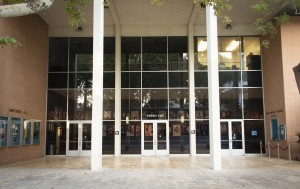
Thomas Fairleigh Denove, professor emeritus in the UCLA School of Theater, Film and Television, received an eight-year sentence in May for two charges of sexual assault of children under 14 years old.
Denove was sentenced to six years for one count of long-term sexual abuse of a child under 14 and two additional years for performing lewd acts on a child under 14. He plead no contest to the charges in November, but did not officially retire from UCLA until December.
UCLA has not sent out a campuswide message regarding his removal.
The UCLA Lab School is located on campus roughly 2,000 feet from TFT offices in Macgowan Hall. The Lab School enrolls roughly 450 children under age 12.
UCLA spokesperson Tod Tamberg said all visitors to the Lab School must have an appointment with a teacher, administrator or staff member. He added there are no reports or evidence that Denove visited the UCLA Lab School or had contact with its students.
Tamberg declined to comment further on behalf of the Lab School.
Jerry Kang, vice chancellor for equity, diversity and inclusion, said previously in an email statement UCLA is considering requiring background checks on faculty hires.
Title IX violations
The UCLA Title IX office released 31 cases of UCLA employees who violated the University of California Policy for Sexual Violence and Sexual Harassment in October.
The documents, which describe incidents of unwanted sexual comments and advances over the last two years, were released following a California Public Records Act request. The documents were heavily redacted.
UCLA spokesperson Ricardo Vazquez said UCLA is committed to maintaining an environment free of harassment and discrimination.
He added he could not provide information regarding UCLA’s plan to communicate updates about the cases to the public or whether redacted names will be released if the respondents’ employments are terminated, because Title IX investigations are confidential.
Student participation in politics predicts more representative public policy
UCLA students and faculty said they are hopeful more students will vote in the 2020 presidential election after an increase in student voter turnout for the 2018 midterm elections.
The 2018 midterm elections saw a 537% increase in in-person UCLA student voters in four years, from 869 students in the 2014 midterm elections to 4,669 students in 2018. Student organizations at UCLA, as a result, said they plan to continue their work of encouraging students to vote.
Sithara Menon, a second-year biology student and chair of the UCLA chapter of California Public Interest Research Group, said one of the effective tactics they used to encourage students to vote in 2018 was calling and texting with information about polling locations.
She said she thinks publicizing the information about the location and the hours of the student polling places made voting more accessible. CALPIRG at UCLA is working on getting a same-day voter registration site on campus to prevent confusion while registering or voting.
“There were a lot of students that we unfortunately had to turn away because they were registered in the wrong county or they thought that California voter registration laws meant that they could register at any polling place,” Menon said.
In addition to registering to vote, another barrier to overcome is the lack of value that students place on their individual votes, Menon said.
“Especially with our current political climate, there are a lot of people who just feel like it’s just not worth it to vote or feel like their vote doesn’t actually matter,” Menon said. “While one individual vote might not seem important as all of our voices together, that actually can make a huge impact.”
The Office of the External Vice President of the Undergraduate Students Association Council employed a variety of strategies to encourage students to vote in the 2018 midterm elections, said Jamie Kennerk, external vice president for the 2018-2019 school year and a fourth-year political science student.
Kennerk said while her office worked with classic strategies such as tabling and sending text reminders, they also partnered with Civic Nation, a grassroots organization, and MTV to put on a voter party outside the UCLA polling location, which she thinks encouraged more students to vote.
Kennerk added she hopes professors can help increase student voter turnout.
“Something that hopefully will be happening eventually is that we can … get a commitment from professors not to have midterms on Election Day because that’s honestly a pretty big barrier to students because it can … take a while to go vote,” Kennerk said.
Kennerk said she thinks students should vote in order to have a greater impact on elected officials.
“When young people are turning out in large numbers, elected officials are so much more receptive to us because now we are a major stakeholder in their constituency,” Kennerk said. “And so showing elected officials that young people are engaged is honestly the first step to getting any of our legislative priorities passed.”
Claudia Peña, a law lecturer at UCLA, said she thinks a major way to encourage students to vote is to use effective and appropriate methods of communication, such as innovative videos and comedy. She said using methods of communication that students are familiar with would make information more accessible to them.
“I think policy and work of the government, since it’s supposed to serve the people, should be accessible to every single person,” Peña said. “So talking about the issues in a way that’s accessible to everybody no matter what their background is, I think is really important.”
Peña said while she was excited by the increase of student voters in 2018, she wishes there would be higher turnout for smaller elections, like school board elections.
“We’re so focused on the big stuff that we miss a lot of the small stuff, so my hope would be that voting (on) something that happens every six months or every four years just becomes normalized,” Peña said.
[Related: USAC sees first independent president, lowest voter turnout in years]
Karin Wang, executive director of the David J. Epstein Program in Public Interest Law and Policy at the UCLA School of Law, said she thinks the increase in student voters in 2018 occurred because students felt they needed to make their voices heard.
Wang added the number of applicants to the Epstein program, a program founded on public interest-based work, has increased in recent years, perhaps for similar reasons.
“Students are charged up by this idea that they can contribute something to the direction of our country and they don’t necessarily like the direction it’s going in, so they’re invested in things like applying to public interest-based work, and I think that extends to voting,” Wang said.
Menon said she is optimistic for the future and she thinks students’ votes can impact society.
“Showing students that they can get involved in the political process and actually have an impact on the world they want to see for the future is really powerful,” Menon said. “If we have a democracy in which everyone votes and everyone’s voice is heard, then we will have a better world to live in, and that’s going to create a political system where we have politicians who really do represent us and listen to us.”
Superlatives: Daily Bruin recognizes UCLA’s standout athletes from 2018-2019
Male Athlete of the Year: Joshua Kelley, football
Jason Maikis, assistant Sports editor
In a rough year for UCLA football, one Bruin stood out in a big way.
Joshua Kelley was a stud. The redshirt junior running back was UCLA’s primary offensive weapon in coach Chip Kelly’s rush-heavy offense and lived up to the task. Kelley averaged 5.5 yards per carry over 225 rushing attempts and amassed 12 rushing touchdowns this year.
No. 27 wasn’t originally UCLA’s workhorse – he was only given 14 total touches in the Bruins’ first two games. But after a stellar performance against Colorado on Sept. 28, when Kelley totaled 124 yards on 12 carries, the running back was solidified as UCLA’s biggest threat on offense.
After an 0-5 start to the season – the Bruins’ worst since 1943 – Kelley delivered a breakout performance to bring home UCLA’s first win. His 157 yards and three touchdowns on 30 attempts carried UCLAto a 37-7 drubbing of California.
However, Kelley’s GOAT – greatest of all time – moment came in UCLA’s biggest game of the year – UCLA-USC at the Rose Bowl.
The Bruins had already been eliminated from postseason contention, but their win versus the Trojans dealt a serious blow to USC’s hopes for a bowl game. Kelley’s 289 yards and two touchdowns in that game earned him the No. 3 spot on the all-time UCLA single-game rushing list.
His 1,243 total rushing yards on the season were tenth in UCLA single-season history. Even with his relatively little usage in the first few games, Kelley finished the season ninth in the FBS in rushing yards per game with 113.
Kelley was a rock for UCLA and came up big when the Bruins needed him, spearheading the Bruins’ attack in two crucial victories and performing among the best in college football.
Female Athlete of the Year: Kyla Ross, gymnastics
Jack Perez, Daily Bruin staff
They call her “Boss” for a reason.
Junior Kyla Ross added to her already decorated career with a record-breaking year for the Bruins. She won the West Region and Pac-12 Gymnast of the Year and was named as a finalist for the Honda Award.
Ross scored 14 perfect 10s over the season – an NCAA record – including 10 straight meets in which she achieved a perfect score in at least one event. She also became the first gymnast to accomplish two Gym Slams in the same season, scoring a perfect 10 on every event twice.
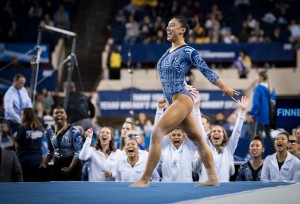
Although the Bruins did not have the same postseason success in 2019 as they did in 2018, Ross won both the vault and floor exercises at the NCAA Championships, becoming just the second person to ever win all four events at the NCAAs in her career. She had previously won the balance beam and uneven bars in 2017.
With one more season left in Westwood, Ross has the chance to break a UCLA record that has stood since 2004. Former UCLA gymnast Jamie Dantzscher currently holds the record for most perfect 10s as a Bruin with 28 during her collegiate career, while Ross sits at 19. If she has another season like this past one, Ross could continue to write herself into the record books.
Rookie of the Year: Megan Faraimo, softball
Coral Smith, assistant Sports editor
On a team full of stars, freshman Megan Faraimo stood out.
The pitcher came to UCLA as last year’s high school Gatorade National Softball Player of the Year, and the expectations were high. She matched and surpassed those expectations, winning Pac-12 Freshman of the Year and being named to the NFCA All-West Region First Team.
Faraimo went 16-4 in 26 appearances for the Bruins, with her 1.44 ERA and her 5.5 strikeout-to-walk ratio both good for top 20 in the nation. The highlights of Faraimo’s season, however, were her two no-hitters – coming just eight days apart – versus Fresno State and Colorado State, respectively.
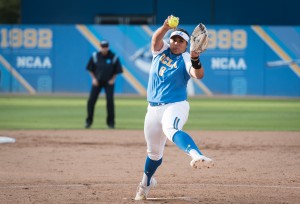
As the Bruins made their run at this season’s NCAA championship, Faraimo played a huge part in the effort, pitching in four postseason games – including a relief appearance in Game 1 of the Women’s College World Series final versus Oklahoma. She went 1-1 in the postseason with a 3.00 ERA, sending the Bruins to Oklahoma City with her series-clinching win against James Madison in the super regional.
And with three years left in her Bruin tenure, one can only guess how far this Rookie of the Year will go.
Most Improved: Jack Ralston, baseball
Sam Connon, Sports editor
When Jack Ralston took the mound in the postseason last year, UCLA baseball’s season came to a close.
The then-redshirt sophomore right-hander capped off 2018 – his first season of game action – by allowing four earned runs in 1 1/3 innings of an elimination game against Minnesota, bumping his ERA to 6.44.
But after Jake Bird and Jon Olsen went pro and junior right-hander Ryan Garcia suffered a flexor injury in the offseason, Ralston entered the season as the Saturday starter.
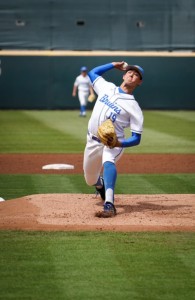
Three and a half months later, Ralston was named an All-American.
The 6-foot-6-inch starter owns a 2.55 ERA and opened the season on an 11-0 tear. Ralston became a legitimate pro prospect, backing up his untapped physical tools by becoming a strikeout specialist and sitting down 41 batters over his last four appearances.
Maybe it was new pitching coach David Berg. Maybe it was a major technical adjustment in the offseason.
But for whatever reason, Ralston made a major leap this year, and Daily Bruin Sports isn’t the only organization that noticed – he got picked in the seventh round of the MLB Draft by the St. Louis Cardinals on Tuesday.
Best Non-Gymnast Gymnast: Sarah Sponcil, beach volleyball
Jacqueline Dzwonczyk, assistant Sports editor
When most people think of UCLA gymnastics, they think of senior Katelyn Ohashi’s viral floor routines.
But beach volleyball senior Sarah Sponcil’s countless videos of her doing handstands around the world can’t be left out of the conversation.
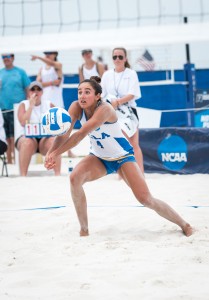
Sponcil has made it a tradition to post videos of her walking on her hands wherever she goes: in front of St. Basil’s Cathedral in Moscow, on the beaches of Hawaii, in the midst of Disneyland’s sparkling attractions or just after practice.
A scroll through the two-time national champion’s Instagram will also reveal videos of her doing flips off cliffs and diving boards, riding a unicycle while spinning a basketball on one finger and pushing herself into a headstand on a paddleboard.
Okay, so maybe those aren’t gymnastics events per se – but it is more than most of us can do.
If Sponcil doesn’t qualify for the 2020 Olympics as a beach volleyball player, she might have gymnastics to fall back on.
One-Hit Wonder: Lauren Brzykcy, women’s soccer/softball
Jacqueline Dzwonczyk, assistant Sports editor
Lauren Brzykcy ran the bases for UCLA softball this season.
One time.
The redshirt freshman goalkeeper played eight games with UCLA women’s soccer in 2018 before making a special guest appearance for softball in the NCAA regional championship in May.
Brzykcy was added to the softball roster as a pinch runner for just one weekend and ran the bases just once. Her one race around the diamond earned the Bruins a run.
The San Clemente, California, native was not on the softball roster for the super regional the following week and she will make her return to the soccer field this summer.
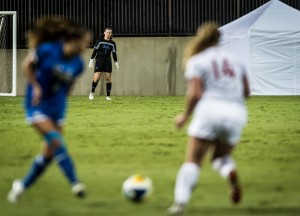
On the pitch, Brzykcy was named to the Pac-12 women’s soccer All-Freshman Team for her 13 saves and .77 goals allowed per game in 2018.
But she can now also call herself a member of an NCAA champion softball team – and she’ll probably get a championship ring to show for her one game.
Cutest Couple: Maxime Cressy and Keegan Smith, men’s tennis
Jared Tay, assistant Sports editor
Senior Maxime Cressy and sophomore Keegan Smith aren’t actually dating, but the duo is a match made in heaven.
Playing at the No. 1 doubles spot for UCLA men’s tennis, the two went undefeated in the 2019 season and capped off their campaign by bringing home the NCAA doubles championship – the program’s second in a row.
Cressy and Smith are the giants of the men’s tennis program – literally. Both standing at 6 feet, 7 inches, they were able to dominate their opponents with massive serves and quick hands at the net.
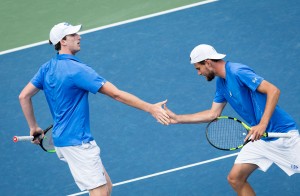
Nobody came close to threatening the duo at the NCAA doubles championship in Orlando. The two did not drop a single set in their five-match championship run and were forced into a tiebreak only once.
When there’s a doubles team whose serve can’t be broken, it’s shockingly hard for anybody to take them down.
In UCLA’s NCAA super regional match against Baylor, Cressy and Smith faced off against the No. 1 ranked team of Jimmy Bendeck and Sven Lah. The match remained unfinished, but Cressy and Smith were on serve, leading the Bears 5-4 when the match was called. They were points away from beating a team who held the No. 1 ranking for the previous seven weeks.
Coach Billy Martin even compared Cressy to a few UCLA doubles legends – Mark Knowles and Jean-Julien Rojer – who, combined, are five-time Grand Slam doubles champions. That’s pretty sick.
It takes a lot of chemistry for a doubles team to be successful, and it’s safe to say a connection like the one shared by Cressy and Smith is found once in a lifetime.
Speed Demon: Devon Bling, men’s golf
Sam Connon, Sports editor
In terms of pure speed, there were some pretty fast athletes at UCLA this year.
Men’s basketball guard, sophomore Jaylen Hands, can probably make it up and down the court faster than any other player in the Pac-12. Freshman running back Kazmeir Allen blazed Cincinnati for a 74-yard touchdown in football’s season opener. Track and Field had its best year in decades, thanks in large part to a wave of new distance runners.
But in terms of who gets from point A to point B the fastest, the easy choice is sophomore Devon Bling.
Bling probably doesn’t have the pure, dynamic athleticism of Hands or Allen, and I don’t even know if he would win a 100-meter dash against his teammates on the men’s golf team. Lucky for Bling, there’s not a lot of running in golf – all you have to do is put the ball in the hole.
And no one does that faster than Bling.
Bling sank a hole-in-one on the final day of the Arizona Intercollegiate on Jan. 29. When he went to Augusta National to play in the 2019 Masters Tournament as an amateur, he sank another ace in the Par 3 Contest.
Technically speaking, Bling isn’t the one moving quickly in these cases – the ball is. But if all Bling has to do is swing his club once before he moves on to the next hole, I’ll give him credit anyways.
Game of Zoning: How Steve Sann’s appeals have obstructed businesses in Westwood
This post was updated June 10 at 1:30 p.m.
Businesses in Westwood have experienced difficulty operating due to appeals and protests – and 61% of the appeals in the last 20 years have been lodged by three community members: Steve Sann, Sandy Brown and Wolfgang Veith.
Appeals are requests to change a project proposal that has been approved by the Los Angeles Department of City Planning. Businesses and properties can be appealed for violations of city planning ordinances and operation.
Protests are letters of opposition to an establishment receiving a license to sell alcohol on their premise and are sent to the California Department of Alcoholic Beverage Control.
Sann, chair of the Westwood Community Council, has filed 22 of Westwood’s appeals since 1998 and protested 16 establishments on their liquor licenses, including Target, D1 Cafe, Tocaya Organica and iPic Theaters, according to California ABC documents. Of the 16 protests, seven are letters of conditional support, in which Sann asked for additional conditions to be placed on businesses’ alcohol permits such as no happy hour discounts or no serving alcohol in pitchers.
[Related: Sports bar Sepi’s to close after struggles over relocation, liquor license]
Protests against liquor licenses can stall a business from opening by six months and cost businesses $15,000 in city filing fees, said Mike Brewer, chief consultant of Alcoholic Beverage Consulting Service.
Similarly, while most of Westwood’s appeals are not granted, the process costs the city $13,538 per appeal, according to city planning documents.
Sann said the 16 protests were all made after an incident in 2013 in which a business negotiated alcohol conditions with him and later tried to remove them. Before 2013, Sann and other community leaders would negotiate with business owners on conditions to present to a zoning administrator for a city level permit. The zoning administrator would then relay the conditions to the California ABC.
Now, Sann protests the licenses directly to the California ABC until the conditions are met and later withdraws them. Of the 16 protests, Sann has withdrawn eight and only three have gone to a public hearing.
Margaret Taylor, CEO and senior consultant for the consulting firm Apex LA, said applying for a city conditional use permit takes about eight months and going through the Westwood Design Review Board application takes four months.
Resolving an appeal adds an additional three to four months to the process, said city planning representative Julia Duncan.
When appeals are filed, a project manager at city planning creates a report to send to the West Los Angeles Area Commission where they either decide then or host a public hearing to grant or deny the appeal.
Protests
Brewer said he thinks Sann is a chronic protester who uses the system to put pressure on businesses coming into the Village.
Sann said he appeals projects because he cares about Westwood Village.
For example, Sann, who has expressed opposition to serving alcohol unconditionally and time-sensitive happy hours, appealed and protested Spireworks, a Mediterranean fast-casual restaurant, in 2016 because he said the area was overconcentrated with alcohol-licensed businesses, according to city planning documents.
At the public hearing for Spireworks, Sann said the business should not receive their license in part because of its close proximity to UCLA.
Additionally, Broxton Brewery was appealed in 2018 by Sann based on conditions not legally required by the city. Taylor, who represented Broxton, said Sann appealed because the zoning administrator did not include extra conditions he wanted.
Sann requested that Broxton refrain from selling alcoholic beverages in pitchers and in quantities over 16 ounces and for last call to be no later than 30 minutes before closing, according to city documents.
Taylor said these were practices the owners were already following.
“I think the uniqueness of how (Sann) appeals projects as opposed to others is that he is more concerned about obstructionism than the outcome,” Taylor said. “This was a nuisance appeal more than a substantive appeal.”
Broxton incurred a $2,000 fee from the city and the project was stalled by four to five months, Taylor said.
A ‘Community Advocate’
Individuals obstructing businesses using city planning appeals and liquor license protests are not unique to Westwood, said Duncan and city planning representative Jason Chan.
A handful of individuals also file appeals in other West Los Angeles neighborhoods, like Venice and the Palisades. Duncan said the Department of City Planning cannot do anything to prevent individuals from filing excessive appeals because it is a public process and anyone has the right to appeal a plan.
Sann is a longtime active resident of Westwood, starting in his undergraduate years at UCLA in 1977. He has created numerous associations and councils composed of stakeholders and initiated numerous community service and entertainment events in Westwood, he said.
Prospective businesses often encounter Sann by reference of the Westwood Neighborhood Council and other community leaders because of Sann’s knowledge of Westwood’s history and inner workings, he said.
Cameron Keller, a third-year political science student who was a member of the WCC, said Sann uses his title on the unofficial board to leverage power and legitimize his role in the Village.
However, Sann said his advising and appeals are separate from his role on the WCC, a nonprofit he started to work closely with the WWNC. The WWNC, along with the North Westwood Neighborhood Council, are advisory boards that are officially recognized by the city of Los Angeles, unlike the WCC.
In a voice recording shared to the Daily Bruin by Michael Skiles, former president and current renter stakeholder of the NWWNC, Sann said to Skiles at a NWWNC meeting that he would oppose any business that does not present to the WCC.
Sann has acted as an informal advisor and community advocate for businesses opening and operating in Westwood. As an individual stakeholder and the chair of the WCC, Sann has also played a role in determining what comes into the Village.
The Community and Sann
Sann’s longstanding involvement in Westwood has led to strict abidances to the zoning ordinances and mixed feelings within the community.
Some business owners are scared of Sann based on his influence and ability to stall their restaurants from opening, said Josh Simms, a Westwood landlord.
Simms said Sann had interacted with four of his tenants: Lemonade, Le Pain Quotidien, Tocaya and Wachovia. Sann sent in a protest for Wachovia and Tocaya’s liquor licenses. Sann’s protest stalled Tocaya’s opening, Taylor said.
Sann’s involvement in the Village also resulted in a lawsuit that was later withdrawn from Medcafe, which operates Skylight Gardens, in 2013 for slander. The lawsuit alleged that Sann had spread a rumor that Skylight Gardens was closing, which led to customers pulling out party reservations and employees leaving, according to court documents.
In a letter to the Westwood Village Improvement Association, a nonprofit organization tasked with improving the state of Westwood Village, Shirin Shojapour, a project manager at D1 Cafe, said Sann pressured the WWNC to reverse their its support of D1’s conditional use permit by speaking to the WWNC land use committee members individually while Shojapour was speaking.
Lisa Chapman, president of the WWNC, said Sann appeals because he cares about the Village and is trying to preserve it.
Sann said he will work with anyone who wants to help the Village thrive.
Wendy-Sue Rosen, the former chair of the Brentwood Community Council and community advocate, has worked with Sann for the last decade and said she has experienced similar backlash from her community. Rosen has filed appeals and lawsuits against developers in Brentwood for the last 20 years.
“The appeals process is set up to give the community a voice,” Rosen said. “(Sann) should be applauded as a champion. We’re fine if someone doesn’t follow code if the benefits are worth it, but what we see is all the detriment and no benefit when developers break regulations.”
Community members voiced opposition to individuals who abuse the appeals process and asked to revise the system at a NWWNC meeting in May.
The council discussed discouraging people from making appeals by increasing the cost of each subsequent appeal, Skiles said.
Skiles said he has yet to hear back from Los Angeles City Councilmember Paul Koretz, who represents Westwood and surrounding areas.
“Businesses just can’t afford to spend years and fortunes fighting (Sann’s) appeals and protests over their liquor permits, food service plans, architecture and parking,” Skiles said. “This is sadly forcing businesses to pursue opportunities outside of Westwood, leaving the storefronts of what should be a vibrant college town chronically vacant.”
